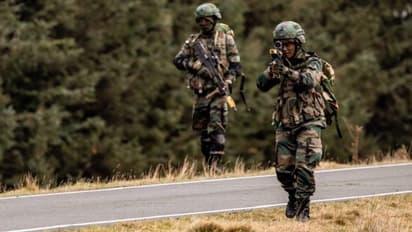Nepal is not ready for Agnipath, delays recruitment for Indian Army

Synopsis
The recruitment process for the Indian Army under the Agnipath scheme was scheduled to start in Nepal on August 25. However, the Nepalese side wants to delay the plan to recruit Nepalese youths under the scheme, which provides for a four-year term with no post-retirement benefits.
The controversy around the Narendra Modi government's Agnipath recruitment scheme for the armed forces seems to have erupted once again, with Nepal announcing a hold on recruitment of its youths till further orders.
The recruitment process for the Indian Army under Agnipath was scheduled to start in Nepal on August 25. Two days ago, Nepalese Foreign Minister Narayan Khadka and Indian Ambassador to Nepal Naveen Srivastava held a meeting to discuss the issues. In the meeting, the Nepalese side informed him to wait on the plan to recruit Nepali youths under the scheme, which provides for a four-year term with no post-retirement benefits.
Also Read: Rafale-M Vs F/A-18: Foreign fighter jets to be on aircraft carrier Vikrant as 'interim arrangements'
The minister told the ambassador that 'if the Nepalese youths are to be recruited for four years with no pensions, there is a need to discuss the matter with all political parties in Nepal and build consensus. Till a further decision is taken, it should be put on hold.'
Meanwhile, New Delhi has said that Nepalese youths will continue to be recruited under this scheme.
"We have been recruiting Gorkha soldiers into the Indian Army for a long time. And we look forward to continuing to recruit Gorkha soldiers in the Indian Army under the Agnipath scheme," Indian foreign ministry spokesman Arindam Bagchi said on Thursday.
The Tripartite Agreement
Presently, around 25,000 Nepal Domicile Gorkhas are serving in the Indian Army. Before the introduction of the Agnipath scheme, the Nepalese youths were being recruited under a Tripartite Agreement between India, Nepal and Britain which was signed in 1947, allowing continued recruitment of Nepalese into the armies of India and Britain.
The Tripartite Treaty, called the 'Memorandum of Agreement on Recruitment of Gorkha Troops', was signed on May 1, 1947, and ratified on November 9, 1947. At the treaty's signing, Nepal had asked that there should be no discrimination, they shall be officered by their own and would not be treated as mercenaries.
Later in 1950, a Treaty of Peace and Friendship was signed between the two Himalayan countries, reinforcing Nepalese citizens' right to work in India and for equal national treatment. There was no mention of any terms of engagement or other benefits in the annexure.
A source in the Indian Army said that the Agnipath Scheme neither violates the Tripartite Agreement nor discriminates against anyone. "The Gorkhas would get the same salaries and facilities as their Indian counterparts would," the source said.
India was to hold recruitment rallies in Nepal in two phases between August 25 and September 7 in Butawal and September 18 onwards in Dharan.
Also Read: From the IAF vault: Story of the 'Top Guns' from India
Stay updated with the Breaking News Today and Latest News from across India and around the world. Get real-time updates, in-depth analysis, and comprehensive coverage of India News, World News, Indian Defence News, Kerala News, and Karnataka News. From politics to current affairs, follow every major story as it unfolds. Download the Asianet News Official App to stay informed anytime, anywhere.